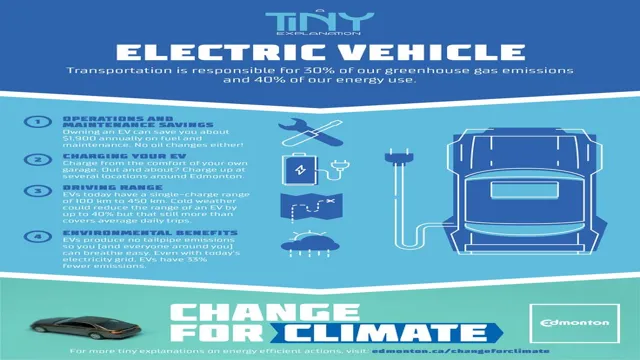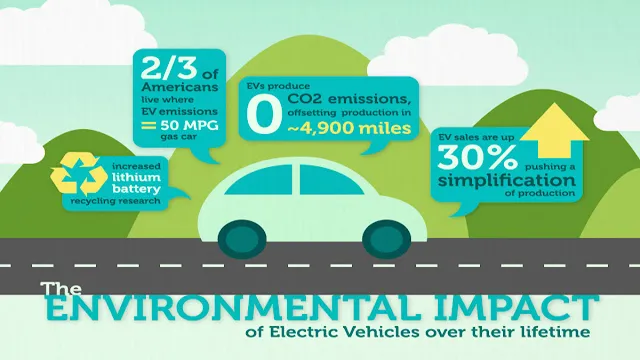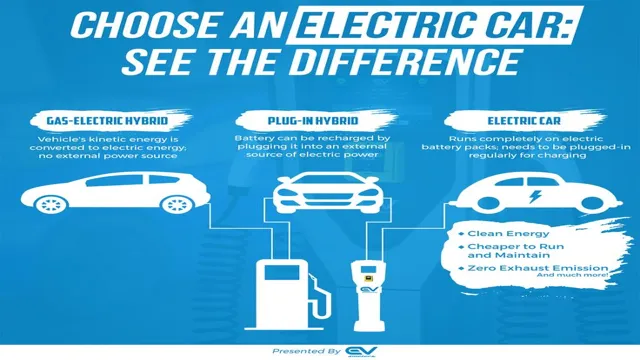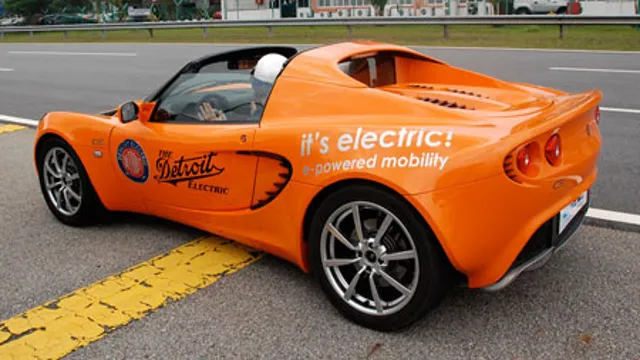Revolutionize Your Commute: Uncovering the Environmental Benefits of Electric Cars
As we move towards a greener and more sustainable future, the demand for electric cars is on the rise. But why choose electric cars over traditional gas-guzzlers? Well, for starters, electric vehicles (EVs) are much better for the environment, producing zero emissions and reducing our reliance on fossil fuels. Not only that, but they also offer a smoother and quieter ride, with instant acceleration and regenerative braking technology.
So, whether you’re looking to reduce your carbon footprint or simply want a more advanced driving experience, electric cars are definitely worth considering. Let’s take a closer look at some of the benefits of going electric.
CO2 Emissions Reduction
If you’re looking for a way to reduce your carbon footprint, consider investing in an electric car. One of the biggest environmental benefits of electric cars is their ability to significantly reduce CO2 emissions. Traditional cars emit harmful pollutants into the air, causing damage to both the environment and human health.
Electric cars, on the other hand, produce zero emissions, making them a much cleaner and more sustainable form of transportation. By driving an electric car, you can help to reduce the amount of harmful pollutants that are released into the air, thereby mitigating the impacts of climate change. Plus, with advances in battery technology and increased access to charging stations, electric cars are becoming a more practical and accessible option for people everywhere.
So why not join the growing movement towards sustainable transportation and invest in an electric car today? Not only will you be doing your part to help the planet, but you’ll also enjoy the numerous benefits of driving a clean, energy-efficient vehicle.
Comparing Gas and Electric Cars
When it comes to reducing CO2 emissions, electric cars are the clear winner over gas cars. Gas cars emit harmful pollutants into the air, contributing to climate change and global warming. On the other hand, electric cars produce zero tailpipe emissions, making them environmentally friendly.
While it’s true that the production of electricity used to power electric cars may contribute to emissions, it’s still less than the emissions produced by gas cars. Plus, with the growing availability of renewable energy sources, the impact of electric cars on the environment will only continue to decrease. So, if you’re looking for a way to reduce your carbon footprint, investing in an electric car may be worth considering.

Factors that Affect CO2 Footprint
CO2 emissions reduction Reducing CO2 emissions is vital for our planet’s future. Several factors influence our carbon footprint, such as transportation, energy consumption, diet, and waste disposal. Whether you take the bus instead of driving, switch to renewable energy, opt for a plant-based diet, or recycle, every little step adds up and helps reduce your carbon footprint.
Adapting these lifestyle changes can benefit not only the environment but also your health and wallet. Making a conscious effort to reduce your carbon footprint can lead to a more sustainable future for generations to come. So, let’s take action and make a difference in our world by implementing CO2 emissions reduction practices.
Air Quality Improvement
Electric cars have numerous environmental benefits, including air quality improvement. Since electric cars run on electricity generated by renewable sources, their use does not contribute to air pollution. Eliminating the emissions from gasoline and diesel-powered vehicles can significantly improve air quality, especially in densely populated areas.
Poor air quality has been linked to several health problems, including asthma and heart disease. By reducing the amount of pollution in the air, electric vehicles can help prevent these health issues and enhance overall quality of life. Additionally, by promoting the use of electric vehicles, governments and businesses can decrease their carbon footprint and take a meaningful step towards mitigating climate change.
As more people adopt electric cars, we can expect to see cleaner air and a healthier planet.
Effects of Fossil Fuels on Air Quality
Air Quality Improvement Fossil fuels have long been an important source of energy for human civilization, but their production and use can have devastating effects on the air quality around us. When fossil fuels are burned, they release a range of harmful pollutants such as carbon dioxide and nitrogen oxide into the atmosphere. These pollutants can contribute to the formation of ground-level ozone, which can have serious health effects such as breathing difficulties and heart disease.
Thankfully, there are many strategies that can be employed to improve air quality and reduce the harmful effects of fossil fuels on our environment. These strategies can range from implementing stricter regulations on industrial emissions to promoting the use of renewable energy sources such as wind and solar power. By taking steps to improve air quality, we can ensure that future generations are able to breathe clean and healthy air.
Benefits of Electric Cars on Air Quality
Electric cars are not only a great way to reduce carbon emissions, but they also have a significant positive impact on air quality. As electric cars run on batteries, they emit zero tailpipe emissions, making them a cleaner and more sustainable alternative to traditional gasoline cars. This means that electric cars can help to reduce harmful air pollutants such as carbon monoxide, nitrogen oxides, and particulate matter, which can cause health problems such as respiratory issues and heart disease.
In addition to reducing air pollution, electric cars also help to reduce noise pollution, making cities and neighborhoods quieter and more pleasant places to be. Overall, the benefits of electric cars on air quality are clear, and as more people adopt this technology, we can look forward to a healthier and more sustainable future for all.
Government Push for Clean Energy
Governments around the world are becoming increasingly aware of the importance of clean energy in reducing air pollution. With air quality becoming a growing concern for many cities, governments are taking action to improve it. One way they are doing this is by promoting the use of clean energy sources such as wind, solar, and hydro power.
These sources of energy are renewable and produce little to no emissions, making them much better for the environment. Additionally, governments are encouraging the use of electric vehicles, which also produce fewer emissions than traditional fuel-powered vehicles. By promoting clean energy and reducing the use of fossil fuels, governments can help to improve air quality and reduce pollution levels.
This will not only benefit the environment, but also human health, as poor air quality can lead to a range of respiratory problems. With governments pushing for clean energy, we can look forward to a cleaner, healthier future.
Reduced Noise Pollution
One of the prime environmental benefits of electric vehicles is that they can significantly reduce noise pollution. Unlike traditional gas-powered cars that create a constant hum and rumble while on the road, electric cars run almost silently. This is due to the absence of a noisy engine, exhaust system, and transmission, all of which generate a great deal of noise when in operation.
This reduction in noise pollution is not only beneficial for drivers, but also for the surrounding community. In urban areas, noise is a common source of complaints from residents, and it can have serious health effects. By switching to electric cars, cities can drastically reduce noise pollution, making neighbourhoods quieter and potentially improving quality of life for thousands of residents.
Overall, electric vehicles offer a more peaceful, sustainable, and community-friendly transportation option.
Environmental Impact of Noise Pollution
Noise pollution is a prevalent environmental problem with severe consequences. It can cause hearing impairment, cardiovascular diseases, and sleep disturbances, among others. Additionally, it affects wildlife, leading to their displacement and habitat loss.
However, several measures can help reduce noise pollution’s impact on the environment. For instance, incorporating sound-absorbing materials in buildings can minimize the noise that escapes into the environment. Also, reducing the use of loud machinery and adopting technologies that promote quiet operation can help.
Furthermore, restructuring roads and highways and developing public transport infrastructure can minimize traffic and associated noise pollution. Overall, taking action to reduce noise pollution can have a positive cumulative impact on the environment, the wildlife, and human health.
Electric Cars Offer Quieter Rides
One of the biggest advantages of electric cars is that they offer a much quieter and more peaceful ride compared to traditional gasoline-powered cars. Noise pollution is a serious issue in many cities around the world, and electric cars can provide a much-needed solution. With an electric motor rather than a gasoline engine, electric cars produce much less noise and vibration.
This means that drivers and passengers can enjoy a more serene driving experience, without the constant hum of a combustion engine. The reduced noise pollution provided by electric cars can also have a positive impact on the environment, as it can help to reduce stress levels and improve overall health and wellbeing. So, if you’re looking for a more relaxing and eco-friendly way to travel, an electric car may be just what you need!
Financial Benefits of Electric Cars
Driving an electric car not only benefits the environment, but it can also have a positive impact on your wallet. While the cost of purchasing an electric car may be higher upfront, the long-term savings through reduced fuel and maintenance costs can make up for it. Electric cars have lower fuel costs since they are powered by electricity, which is cheaper than gasoline.
Maintenance costs are also lower, as electric cars have fewer moving parts and require less frequent servicing. In addition, federal and state financial incentives, such as tax credits, can further reduce the cost of owning an electric car. Investing in an electric car can be a smart financial decision in the long run, while also contributing to a cleaner and more sustainable future.
Overall, the environmental benefits of electric cars go hand in hand with financial benefits.
Conclusion
In conclusion, electric cars offer a slew of environmental benefits that are hard to ignore. They emit zero tailpipe emissions, reducing air pollution and improving air quality in urban areas. At the same time, they help to decrease carbon emissions, combating climate change and its impact on the planet.
So, the next time you hear someone ask ‘why switch to an electric car?’ remind them that the answer’s simple – save the planet, drive electric!”
FAQs
What are the environmental benefits of electric cars?
Electric cars emit far less carbon dioxide and other harmful pollutants than traditional gas-powered cars. Additionally, they do not release harmful emissions during operation, helping to reduce the overall impact on the environment.
Do electric cars produce any emissions?
While electric cars do not emit any pollutants during operation, the power grids they rely on for charging may be fueled by non-renewable sources that produce emissions. However, studies have shown that electric cars still produce significantly less emissions than traditional gas-powered cars.
Are electric cars more expensive to maintain?
Generally, electric cars require less maintenance than traditional gas-powered cars due to the lack of complex systems such as engines and transmissions. Additionally, electric motors have fewer moving parts, reducing wear and tear.
How far can an electric car travel on a single charge?
The distance an electric car can travel on a single charge varies based on the make and model of the vehicle, as well as driving conditions such as terrain and weather. However, most modern electric cars have a range of at least 100 miles, with some high-end models boasting ranges of over 300 miles on a single charge.



